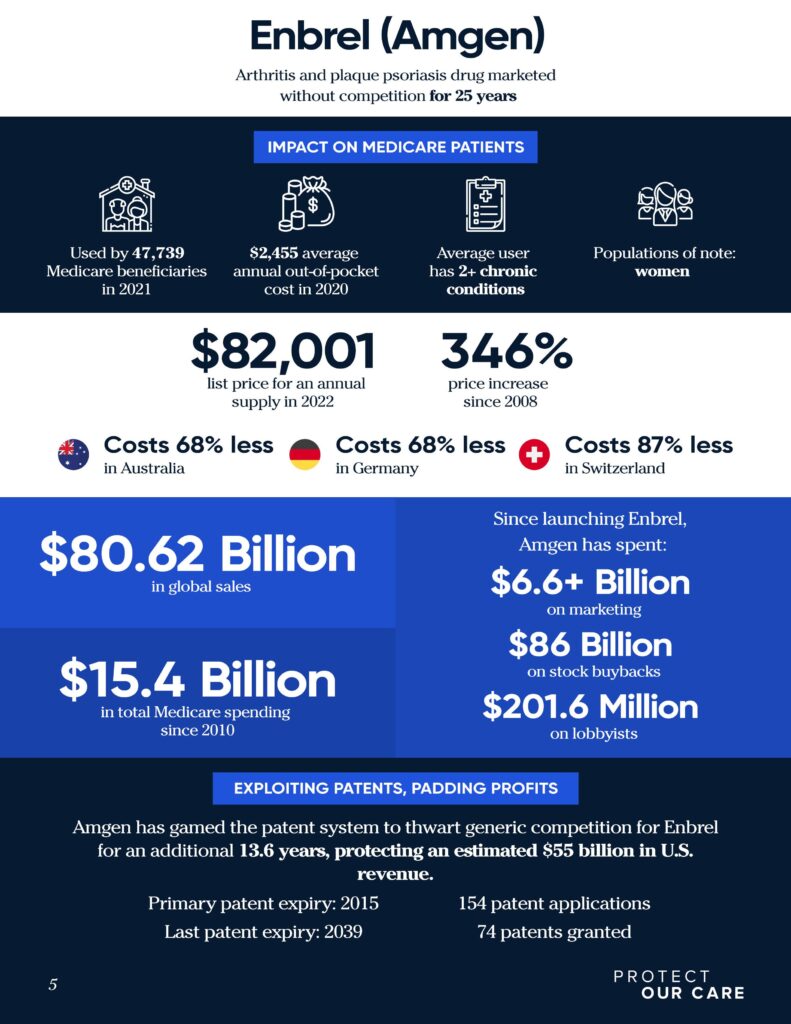Last week, more than 300 experts and groups signed onto briefs calling for the Fifth Circuit to protect the Affordable Care Act’s (ACA) no-cost preventive care provision relied on by 150 million Americans. The briefs include leading patient and provider groups, legal and public health experts, organized labor, and more — including the Robert Wood Johnson Foundation, the American Medical Association, the Susan G. Komen Breast Cancer Foundation, the American Lung Association, the American Cancer Society, AARP, SEIU, the American Public Health Association and 24 state attorneys general. Protect Our Care joined a brief with 16 other advocacy groups warning that if Judge Reed O’Connor’s ruling stands, the consequences for patients would be devastating.
In March, District Judge Reed O’Connor in Braidwood Management v. Becerra struck down a provision of the ACA that requires insurers to cover lifesaving preventive services without cost sharing. Braidwood is a politically-driven effort to dismantle the ACA, brought by longtime foes of abortion rights, women’s health, LGBTQI+ rights, and affordable health care. Judge O’Connor is the same judge who ruled in 2018 that the ACA should be overturned.
Judge O’Connor’s order in Braidwood applied nationwide. Earlier this month, the Fifth Circuit Court of Appeals granted a partial stay pending appeal in Braidwood Management v. Becerra, protecting free preventive care for 150 million Americans as the case moves through the courts.
The ACA elimination of costs for lifesaving screenings and services saved countless lives, improved health outcomes, reduced disparities in care, and cut consumer health care costs for more than 150 million people. Guaranteed no-cost coverage of preventive services, including screenings for chronic disease, is critical to ensuring everyone has access to the same quality health care, no matter where they live or the color of their skin.
Protect Our Care and 16 Other Health Advocacy Groups Submit Amicus Brief to Protect No-Cost Preventive Coverage. “The District Court’s ruling would explicitly eliminate the no-cost coverage requirement for all preventive services that USPTSF has recommended with an “A” or “B” rating since 2010 (and will recommend in the future), thereby decimating affordable access to evidence-based services that protect the health of millions of Americans. Even modest out-of-pocket costs reduce utilization of health care services. For instance, higher levels of cost-sharing negatively affect prescription drug adherence. Poor medication adherence in turn causes higher rates of mortality, hospitalization, and complications, all of which increase costs for consumers as well as other payers in the healthcare ecosystem. The harmful effects of taking away coverage requirements and cost-sharing prohibitions for services recommended after 2010 would compound over time, as the recommendations in place at that time become more and more out of date. As new preventive services and drugs are introduced and adopted, even those recommended by the USPSTF’s medical experts would be covered only at the discretion of insurers and employers. The services to which the ACA requirements apply would not reflect current evidence and best practices, affecting patient care and safety.” [6/27/23]
The HIV Medicine Association (HIVMA) and the National Alliance of State and Territorial AIDS Directors (NASTAD) File a Friend-of-the-Court Brief Urging the Reversal of the 5th Circuit’s Preventive Care Ban. “Make no mistake: the District Court’s decision, and the resulting re-imposition of cost-sharing for PrEP, will cause tens of thousands of new but preventable HIV infections, erode or even reverse progress to date, and undermine public health efforts to end the HIV epidemic. The consequences to individual health are profound as well. Even with effective antiretroviral treatment, people diagnosed with HIV today have an incurable and highly stigmatized health condition that also increases the risk of other life-threatening diseases.” [6/28/23]
A Coalition of 24 State Attorneys General File an Amicus Brief to Protect Preventive Health Care. “In addition to directly harming millions of state residents by reviving financial barriers to obtaining preventive care, an injunction enjoining all or part of the preventive services provision would hamstring the amici States’ ability to protect their residents’ health and welfare. [F]ederal regulation of insurance coverage is a critical supplement to… state efforts because the States cannot, under federal law, mandate insurance requirements for a large category of insurance plans and because the States rely on federal guidance even when they are able to mandate specific coverage. Eliminating the preventive services provision would thus deprive the States of an important mechanism for facilitating uniform and comprehensive access to preventive care.” [6/29/23]
More Than 100 Public Health Deans, Scholars and Advocates Joined The Robert Wood Johnson Foundation and , American Public Health Association, and Public Health Advocates In AnSubmit Amicus Brief to Protect Access to Preventive Care. “The district court’s decision eliminates this requirement nationwide for dozens of life-saving services recommended by the USPSTF—every preventive service specified after the enactment of the ACA in 2010. Without the ACA’s requirement, some companies and insurers will re-impose cost-sharing. Some may eliminate coverage completely. It is certain that without cost-free coverage, many Americans will not use these services: studies consistently demonstrate that when people are required to pay part of the cost of preventive care, they often do not obtain it. That will lead to more serious illnesses and even deaths among the individuals deprived of coverage. It also will affect Americans more broadly, because many of the covered services prevent and treat illnesses that, if not detected and treated, can be spread among the population generally.” [6/27/23]
The HIV+Hepatitis Policy Institute and 24 Other HIV and Hepatitis Organizations File Brief in Support of U.S. Government Protecting Preventive Care. “The district court’s decision to invalidate USPSTF’s recommendations, including PrEP access, based on a fundamental misunderstanding of HIV transmission, risks upending decades of progress in the fight against a serious, life-threatening condition. In the 42 years since HIV was first identified, we have made near-miraculous strides in reducing deaths, severity of symptoms, and transmission. It is now possible for people living with HIV to live long, full lives due to improvements in the detection, treatment, and prevention of HIV. Collectively, these components represent a continuum of care.33 When any one component is weakened, the risk of transmission increases.34 Studies show that people who know their HIV-positive status play an active role in reducing HIV transmission.35 Testing is the only way to determine HIV status.” [6/23/23]
The American Cancer Society, The AIDS Institute, and Other Patient Groups Representing Millions Files Brief in Support of the DOJ’s Defense of the Affordable Care Act. “Eliminating mandatory coverage without cost sharing for the preventive blood pressure, cholesterol, diabetes, obesity, and other screenings related to cardiovascular diseases would reduce patient access, meaning risk factors for heart disease would increasingly go undetected. Such circumstances would prevent patients from managing their risk factors and reducing their risk of developing heart disease. Adding costs to routine preventive services… would cause patients to choose between treating a current illness or trying to prevent new ones. Studies relevant to the diseases that are the focus of amici’s efforts show USPSTF-, ACIP-, and HRSA-recommended preventive services also reduce costs for individuals and the U.S. health system.” [6/27/23]
American Lung Association and a Dozen Other Nonprofits File Amicus Curiae to Defend Preventive Care Access. “[V]ast numbers of people have relied on the ACA’s guarantee of cost-free coverage for preventive services, with about 60 percent of insured Americans—roughly 100 million people—utilizing such services in 2018. By unsettling this guarantee and allowing insurers to impose costsharing requirements for—or decline to cover—services that received Task Force recommendations following the ACA’s enactment, the district court’s remedy put millions of patients at risk of losing cost-free access to critical care and compromised clinical efforts to control cancer, reduce the spread of disease, and address other public-health concerns.” [6/27/23]
National Health Law Program Files Amicus Brief Warning of Braidwood’s Profound Harmful Consequences for Individuals and Families on Medicaid. “Medicaid’s scope of benefits is designed to ensure that enrollees have coverage for critical health services. [S]tates must cover certain services and have the option to cover others. Medicaid coverage of preventive services could be jeopardized if the Court affirms the lower court or upholds Braidwood’s challenge to the PSTF’s authority to recommend preventive services and ACIP’s authority to recommend vaccines. Medicaid Act coverage of adults’ preventive services and vaccines is tied to PSTF and ACIP recommendations. Thus, the Court’s decision could affect this coverage in the future, leading states to reduce coverage or charge cost sharing for preventive services that… are unquestionably benefiting low-income adults. If Braidwood’s claim to nullify ACIP-recommended vaccines succeeds, it could lead to coverage disruptions for children in low-income families who have health coverage through Medicaid and no other means of obtaining potentially lifesaving immunizations.” [6/27/23]
HIV Drug Manufacturer Gilead Sciences Submits Amicus Brief in Support of Defendants. “For all groups, a reduction in the HIV transmission rate is an unqualified good—it means better health outcomes, a reduction in the medical expense associated with treating HIV and the other chronic conditions associated with the virus, and progress toward ending a decades-long epidemic. Despite all of this, the district court entered a nationwide injunction that categorically precludes the government from maintaining or enforcing the coverage mandate for PrEP and the associated preventive services—not just against the plaintiffs, but against any employer or health insurance plan in the United States. [P]ermitting insurers to reimpose cost sharing for preventive services recommended by USPSTF would exacerbate [racial and ethnic] inequalities by placing another barrier between PrEP and the individuals who could benefit most from the medication and related testing, monitoring, and counseling.” [6/27/23]
The Service Employees International Union Files Amicus Brief in Support of Their Physician Members. “As borne out by the experiences of SEIU’s physician members, the mandate to make preventive care available at no cost has saved lives, and the district court’s decision, by reducing access to that care, will negatively affect millions of Americans’ health. Yet the district court, in flagrant disregard of the governing legal standards, failed even to address or acknowledge the significant negative effects its judgment will have on millions of non-parties. The district court’s judgment also interferes with the statutory and due process rights of non-party employees and their families, and for that additional reason should be reversed.” [6/27/23]
The American Medical Association and 16 Other Medical Groups File Brief to Defend Preventive Services. “For the reasons that the government explains, the decision… regarding USPSTF services is wrong on the law and should be reversed on the merits. At minimum, this Court should reverse the nationwide injunction that the district court issued. The district court’s holding with respect to Task Force services—and, crucially, its imposition of a nationwide injunction rather than plaintiff-specific relief—jeopardizes coverage of preventive services that plaintiffs never suggested injure them in any way. Such a decision would allow insurers nationwide to reimpose cost-sharing requirements on millions of Americans. In other words, it would allow insurers to charge their enrollees—amici’s patients—for mammograms, colonoscopies, and other services at will.” [6/27/23]
Susan G. Komen Breast Cancer Foundation Submits Brief to Protect Access to Breast Cancer Preventive Services. “[B]y removing cost-sharing for these preventive care measures, the passage of the ACA is associated with increases in both (a) genetic testing and (b) access to Medicaid‐financed prescriptions for breast cancer hormonal therapies (at least within Medicaid expansion States). The ACA’s preventive care coverage has even helped cancer survivors obtain necessary care. The district court held unlawful ‘[a]ll agency action taken to implement or enforce the preventive care coverage requirements in response to an ‘A’ or ‘B’ recommendation by the [USPSTF] on or after March 23, 2010.’” [6/27/23]
The AARP Files Amicus Brief Outlining the Risks to Seniors That Could Come from Braidwood’s Ruling. “[T]he District Court held that all actions taken to implement or enforce the preventive care coverage requirements for the services recommended by USPSTF on or after the passage of the ACA were unlawful. This breathtaking universal remedy was in error because the District Court failed to consider the harm such a remedy would cause. First, the District Court failed to consider the value of these services to millions of Americans. In particular, more than half of the USPSTF recommendations at issue directly benefit the health and wellbeing of older adults ages 50-64, people who do not yet qualify for Medicare. Second, the District Court ignored the importance of providing preventive care with no cost sharing. Among older adults, access to preventive care and utilization of preventive services has increased because of the ACA’s elimination of cost barriers. Likewise, by increasing access, the preventive services at issue here have helped mitigate health disparities. Finally, the District Court did not account for the significant negative consequences to the health and financial security of Americans, including older adults, if the District Court’s universal remedy is left in place. For these reasons, and for those described in Section III of the DefendantsAppellants brief, reversal of the Court’s universal remedy is warranted.” [6/27/23]
A Group of 49 Bipartisan Economic and Social Science Scholars File Brief Warning of Consequences to Braidwood Ruling. “The ACA’s Preventive Services Provision reflects decades of health economics research regarding the advantages and drawbacks of cost-sharing. Studies consistently demonstrate that individuals seek out fewer health care services, across the spectrum of care, in response to cost-sharing. A recent survey found that 60 percent of adults in employer plans who either had high out-of-pocket costs or deductibles relative to their income reported not obtaining needed health care due to cost. Preventive care provides the quintessential example of a category of health care services that requires economic incentives to influence optimal consumer behavior. For the reasons set forth in this brief, preventive services provide substantial economic benefits. If consumers no longer have access to preventive services without cost-sharing, they will predictably use fewer of those services, not only damaging their own health, personal finances, and long-term productivity but also increasing the costs imposed on our national system of health care financing, which substantially relies on government payers.” [6/27/23]
Blue Cross Blue Shield Files Brief Against the 5th Circuit Ruling of Braidwood. “Before ordering permanent equitable relief—especially on a nationwide basis—the district court was obligated to consider whether any such relief would be in the public interest. It did not do so. If it had performed that analysis, it would have encountered overwhelming evidence that the Preventive Services Mandate has greatly improved the accessibility of essential coverage, and that rolling it back would have the opposite effect, causing enormous disruption for patients, health plans, and healthcare providers. Indeed, immense amounts of research, reporting, and analysis confirm that the Preventive Services Mandate has been an enormous policy success, and that the public interest strongly favors maintaining it. Because the district court erred in failing to consider the public interest, this Court should vacate the district court’s remedial order.” [6/27/23]
The American Hospital Association and 4 Other Hospital Groups File Brief in Support of the DOJ’s Defense. “The District Court’s order, which inhibits access without cost-sharing to certain preventive-care services, will have a profound, negative impact on patients across the country. For instance, the District Court’s order will adversely affect pregnant and postpartum women. Under the ACA and current recommendations of the Task Force, eligible women can receive free screenings for perinatal depression and other preventive services. The District Court’s decision also will remove the guarantee of other costfree preventive services for adults and children. These services include anxiety screenings for children and adolescents, which have become increasingly important in recent years due to the negative mental health impacts of the COVID19 pandemic and social media on children. The adverse health impacts of the District Court’s decision will be significant because patients typically do not seek preventive care if there is even a modest financial barrier.” [6/27/23]





